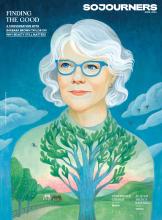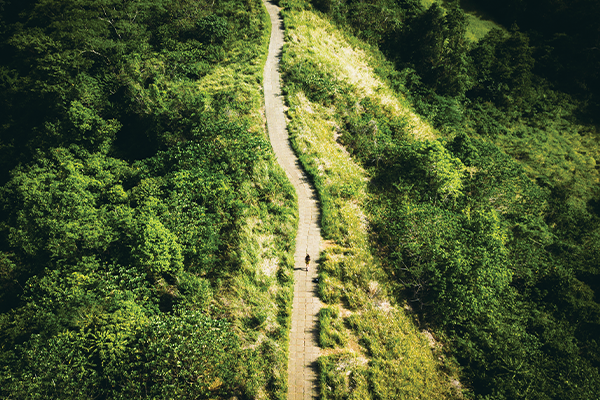I LOVE TO walk. I came by this love naturally. My mother, now well into her 80s, is a dedicated walker, spending at least 30 minutes each evening walking on her treadmill. In earlier years, especially when the winds of the Kansas plains died down late in the day, she would walk the half-mile dirt road to our mailbox and back.
I’ve added three Labrador retrievers to my walking ritual — Hershey, Pippi, and Rue — who delight in a daily routine of getting outside, noses to the ground, tails in the air, ears perked and attuned. Responding to the rattle of their leash, each one’s anticipation is uniquely their own — a hop, a tail whipping against my leg, a wet nose urgently working to get the collar in place.
In recent years, after experiencing the awe of walking in the Pacific Northwest, where lush forests and rippling rivers drew my husband and me to their sacred cathedrals, we have started structuring vacations around where we want to hike. Step after step, we take in nature’s altars, praying with our feet, ingesting nature’s elements in holy, full-bodied communion.
In her book Enchantment: Awakening Wonder in an Anxious Age, Katherine May articulates what I feel when I’m walking. Enchantment, she writes, evokes a deep knowing that “something is there, something vast and wise and beautiful that pervades all of life. Something that is present, attentive, behind the everyday. A frequency of consciousness at the low end of the dial, amid the static. A stratum of experience waiting to be uncovered.” This is precisely why I have taken my worship on the road.
The Bible is replete with people who go walking and end up finding themselves in the process. Patriarch Abram, for example, was called to leave his home in Ur and walk to a new place in a more fertile valley where he made his new home with Sarai. Or consider the ancient Israelites who escaped the oppressive Egyptian pharaoh — and walked in the desert for a generation. Also don’t forget one of the Bible’s most familiar walks: the one taken by Ruth and her mother-in-law, Naomi. While the narrator shares few details of their journey, their trek from the hinterlands back to Naomi’s hometown must have been an adventure of dangerous proportions.
Walking requires a willingness to leave one place and go to another. And somewhere along the road, in the liminality of “not-there-yet,” transformation becomes possible.
Read the Full Article

